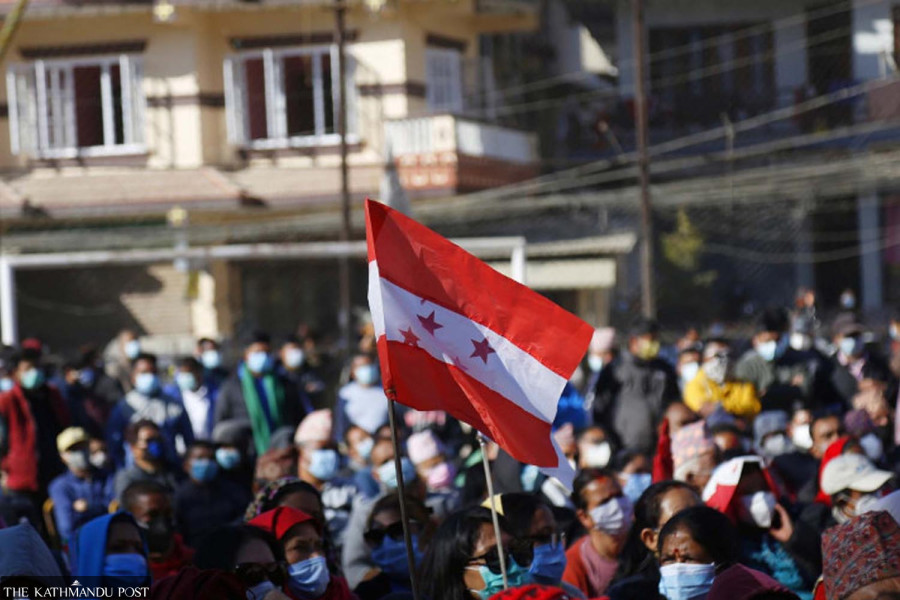Politics
Youth leaders mobilise to ‘save’ Congress
Second-rung leaders to travel the country to ‘unite cadres and reconnect with voters’.
Nishan Khatiwada
Against the backdrop of recent electoral setbacks, a section of the Nepali Congress leaders is launching a nationwide campaign to shore up the grand old party.
The party’s youth leaders are planning to traverse the country with the Nepali Congress Rupantaran Abhiyan (transformation campaign) to unite cadres across the country and reconnect with voters. The leaders said they have taken serious note of the party’s poor showing in the recent by-elections and poorer-than-expected performance in last year’s parliamentary and local polls.
Under the campaign, major gatherings are scheduled in Madhesh Province on Thursday, in Bagmati on May 30, in Gandaki on June 3, in Lumbini on June 5, in Karnali on June 7, in Sudurpaschim on June 9, and in the Koshi province on June 11.
“We faced a heavy defeat in the bypolls despite having an electoral alliance. If we don’t act now, the new parties will leave us further behind,” said Bhupendra Jung Shahi, a Congress leader. “We want to regain public trust and boost cadre confidence through this campaign.”
He said they decided to organise the gatherings as the party establishment has been ignoring pressing concerns related to party organisation and recent political developments and refusing to hold even a central committee meeting to discuss such concerns.
Recently, Congress party leadership has been fiercely criticised by several of its own independent-minded leaders for their inactivity.
Many vacancies in the party’s departments and the central committee have not been filled for long while its sister organisations also remain incomplete and passive.
This, however, is not the first time the party’s leaders, especially those in the second rung, have raised the need to revive the Congress.
Its two general secretaries Gagan Thapa and Bishwa Prakash Sharma have long been calling for the need to “overhaul” the party to prevent it from becoming irrelevant.
On May 7, General Secretary Thapa took to Twitter to express his frustration, saying: “Sometimes, [I] didn’t like the process, sometimes the system, and I did not like many decisions, many issues I raised did not get a space, many a time (I) thought I should resist, but every time, I thought I had a responsibility and a boundary. So, sometimes I was silent, sometimes, I expressed my views within the party, fought there, gave suggestions, but now it is too much,”
Although Thapa and Sharma are seen as advocates for reform, they have so far failed to bring about any substantive change in the traditional and centralised decision-making style despite holding two key positions in the party.
Interestingly, the two general secretaries are not actively involved in the latest campaign. Those active in convening the gatherings include youth leaders Guru Ghimire, Madhu Acharya, Ranjit Karna and Shahi, among others.
Shahi, who is optimistic about the campaign’s success, argues that even the party’s top leaders must support it in order to save the party.
“This campaign is different to the previous unsuccessful ones. Most of the previous campaigns were basically general-convention oriented, and promoted factionalism in the party,” he said. “But the sole motive of the current campaign is to rejuvenate and strengthen the party. It does not recognise any faction.”
The recent victories of the Rastriya Swatantra Party (RSP) in Tanahun and Chitwan by-elections have shaken the traditional parties, including the Congress, the CPN-UML and the CPN (Maoist Centre), to the core. A noted economist quit the Congress to join the newly formed Rastriya Swatantra Party just ahead of the elections and defeated the Congress candidate with a huge margin in Tanahun, a Congress stronghold, even as the ruling coalition had backed the Congress pick.
Despite Shahi’s claims, observers doubt the campaign is not faction-riddled as well. Rampant fractionalisation has long plagued the Congress party.
“Campaigns for transformation should aim to root out factionalism in the party. But such moves have mostly been about ‘this power centre versus that power centre’ principle, made with the intent of replacing one power centre with another,” said Purushottam Dahal, a senior journalist who closely follows the Congress.
Dahal doubts the latest one is a principled campaign that can buck the trend. “There is a common perception in the Congress that leaders should gang up on the party president. Even if a faction becomes successful in ousting the party leadership, will that ensure an end to factions and divisions in the party? No!” he said.
Laxman Ghimire, a former minister from the Congress, said the current efforts of the second rung leaders should aim at ideological and policy transformations for long-term impact. “The main problem is that the party has abandoned its core values such as nationality, democracy, and socialism inspired by the founding leader BP Koirala,” he said, adding, “for the young leaders to ignore these core values in their campaign would be like applying a flimsy bandage on a gaping wound.
The Congress emerged as the largest party in Parliament from last year’s major polls, winning 89 seats, at the head of a five-party electoral alliance. The by-elections results truly alarmed party leaders as the polls saw a huge shift of the party’s traditional votes towards the new Rastriya Swatantra Party.
Ghimire said gathering cadres and lashing out at the establishment alone will not work. “The Congress cannot be revived if it continues to ally with extreme communist forces by compromising on its core values. The second-rung leaders should be vocal at rooting out this trend,” he said.
Some observers say those claiming to be working for the transformation of Congress are also only interested in their own betterment. It is a pity of Congress that its leaders speak up for transformation only when their own careers are threatened, said Uddhab Pyakurel, a political analyst. “Yes, transformation is necessary. But the advocates of transformation should be guided by selfless motives.”




 18.12°C Kathmandu
18.12°C Kathmandu















